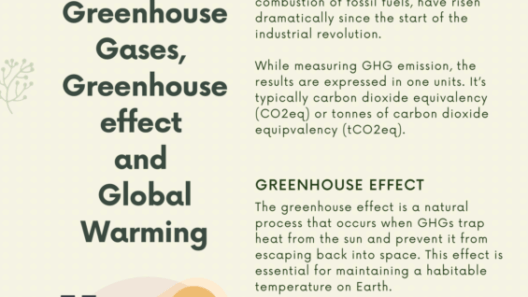Global warming, the gradual increase in the Earth’s average temperature, is a phenomenon that fundamentally alters our climate and, by extension, the intricate tapestry of life on our planet. Despite its profound implications, many people respond with skepticism when confronted by the stark reality of this predicament. Understanding the deeper ramifications of global warming, however, is essential for fostering a widespread acknowledgment of its significance and urgency.
At its core, global warming is driven by an accumulation of greenhouse gases (GHGs) in the atmosphere, primarily carbon dioxide (CO2), methane (CH4), and nitrous oxide (N2O). These gases, while natural constituents of the Earth’s atmosphere, have reached alarming levels due to anthropogenic activities, such as burning fossil fuels, deforestation, and industrial processes. This enhancement of the greenhouse effect traps heat, leading to a cascade of environmental consequences that extend far beyond rising temperatures.
One prevalent observation among skeptics is the seasonal fluctuation of temperatures. They point to colder winters or cooler summers as evidence against the notion of a warming planet. This perspective, however, often fails to grasp the complexity of climatology. Climate is not synonymous with weather; while weather represents short-term atmospheric conditions, climate embodies long-term trends. The overall trajectory of global temperatures is unequivocally upward, even amidst localized anomalies that may give the impression of a temporary respite from warming.
As the global temperature ascends, various consequences become undeniably evident. Ice caps and glaciers, once majestic symbols of Earth’s pristine beauty, are receding at alarming rates. The Arctic, in particular, has warmed approximately twice as fast as the global average due to a phenomenon known as Arctic amplification. The reduction of ice cover not only diminishes the habitats of iconic species like polar bears and seals but also contributes to rising sea levels. As glaciers melt and thermal expansion occurs in the oceans, coastal areas face unprecedented flooding, threatening the homes and livelihoods of millions.
Moreover, global warming exacerbates extreme weather events. Instances of hurricanes, droughts, and heatwaves have become more frequent and intense. The economic ramifications are staggering, impacting agriculture, infrastructure, and public health. Heat stress and water shortages threaten food security, while the deluge of floods can devastate entire communities, creating humanitarian crises that strain relief efforts worldwide.
In addition to environmental and economic repercussions, global warming poses significant health risks. The increase in temperatures can exacerbate air quality issues, leading to respiratory diseases and cardiovascular problems. Vector-borne diseases, such as malaria and dengue fever, are projected to spread into regions previously unaccustomed to such threats, increasing the burden on public health systems. The interconnection between climate change and public health underscores a crucial but often overlooked dimension of this crisis.
Addressing global warming necessitates a multifaceted approach, emphasizing mitigation and adaptation strategies. Transitioning towards renewable energy sources such as solar, wind, and hydroelectric power can significantly reduce carbon emissions. Enhancing energy efficiency in industrial processes and buildings can also contribute to lower overall energy consumption. These measures are not merely theoretical; numerous countries are already experiencing the economic benefits of investing in renewable technologies.
Adaptation is equally vital in confronting the realities imposed by global warming. Urban planning must evolve to incorporate resilience strategies, such as creating green infrastructure that can absorb floodwaters. Agricultural practices must shift to ensure food security amidst the reality of shifting climatic patterns. Coastal protection measures, such as sea walls and managed retreat, can safeguard communities from rising seas.
A common observation is that global warming is often perceived as a distant problem, one that may impact future generations. However, this misapprehension is a dangerous misconception. The effects of climate change are already palpable, and action must be taken now to mitigate further damage. It is an urgent call for collective responsibility, not only from governments but also from individuals, corporations, and communities. Awareness and education play pivotal roles in shifting public perception from indifference to active engagement in the climate crisis.
Engaging in dialogue surrounding climate change is essential. Conversations should be grounded in science, yet accessible to all. The fascination with global warming extends beyond the environmental realm; it interweaves themes of justice, ethics, and intergenerational equity. The most vulnerable populations, often least responsible for greenhouse gas emissions, are disproportionately affected by climate change, highlighting the moral imperative to act. This intersectionality evokes a deeper awareness of how global warming encapsulates broader societal issues.
Ultimately, the challenge of global warming compels individuals and societies to re-examine their values and priorities. Recognizing the interconnectedness of all life forms on this planet reinforces the notion that we share a collective responsibility to safeguard our environment. The future of the Earth hinges on proactive engagement with this existential threat. Through concerted efforts, driven by a commitment to sustainability and equity, humanity can forge a path towards a stable climate and healthier ecosystems for generations to come.
As the global community confronts the multifaceted challenges posed by global warming, there lies an opportunity: to unify around a shared vision of a sustainable and equitable future. The urgency for action cannot be overstated—it is imperative that we rise to the occasion, not only for ourselves but for the myriad species that share our planet. Addressing global warming is not simply an environmental concern; it is a defining issue of our time, demanding our immediate attention and unwavering dedication.








